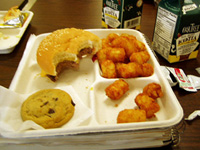
Source: My lab, jawcey, Flickr

Source: Honda, linsulin, Flickr

Source: Horse being Nosey, sms467, Flickr
Have you ever told your parents that you had a “ton” of homework? Perhaps you have complained that your car was “a million years old.” Maybe you have even remarked that you were so hungry you could “eat a horse.”
If so, you were deliberately exaggerating, or using hyperbole. A hyperbole is an overstatement of an idea. It is a rhetorical device or figure of speech used to evoke strong feelings or create a strong impression. A hyperbole is an obvious and intentional exaggeration not intended to be taken literally.

Source: @ NCTA: On The Floor -- Peyton Manning, Eli Manning & friend, sdk, Flickr

Source: Hg, perfectsnap, Flickr

Source: They Fed Us Garbage, VC Geist, Flickr
Have you ever commented that Eli and Peyton Manning are “not bad” football players? Maybe you don’t watch football, but you do pay attention to the weather. Maybe you have said it’s “a little warm” when the temperature was over 100 degrees, or maybe you have gone to a restaurant and said the food “left something to be desired” when it was actually terrible.
If so, you employed understatement. Understatement is the exact opposite of hyperbole. When writers use understatement, they deliberately say less than they mean. Hyperbole and understatement always carry a tone of irony and may be funny.
In this lesson, you will learn to recognize hyperbole and understatement and explain an author’s purpose for using each.